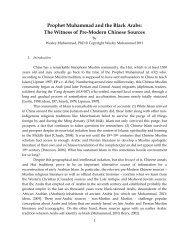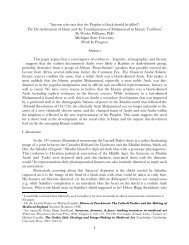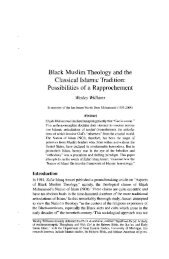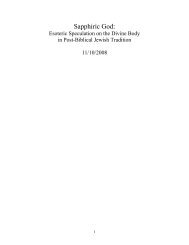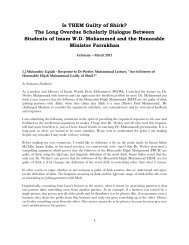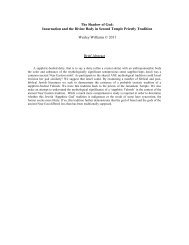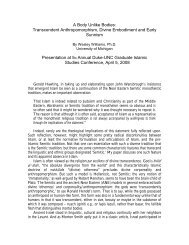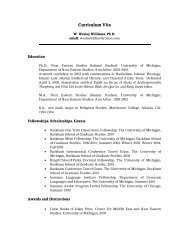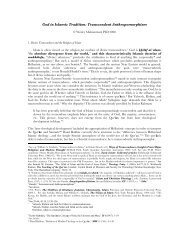Is THEM Guilty of Shirk? - Dr. Wesley Muhammad
Is THEM Guilty of Shirk? - Dr. Wesley Muhammad
Is THEM Guilty of Shirk? - Dr. Wesley Muhammad
You also want an ePaper? Increase the reach of your titles
YUMPU automatically turns print PDFs into web optimized ePapers that Google loves.
―When the Prophet tells his people that Allah will hold all <strong>of</strong> the heavens and the earth in<br />
His right hand, do you really think he is talking about Allah's human right hand? Do you really<br />
believe that Prophet <strong>Muhammad</strong> is suggesting that Allah's hand is a human hand like Master<br />
Fard's or his own and that He will use it to hold the skies and the earth? <strong>Is</strong>n't it more reasonable<br />
and intelligent to reason that he is making a parable to give the people an idea <strong>of</strong> the vastness and<br />
greatness and bigness <strong>of</strong> Allah, whom they cannot grasp with their vision? We can't see the<br />
bigness <strong>of</strong> Allah, so the prophet gives us a parable in terms the uneducated Arabs could<br />
understand.<br />
―Doesn't that explanation make more sense than trying to figure out how a human being<br />
standing on a corner in Detroit or Chicago is going to grow his hand so that it can hold the sky<br />
and earth while he is standing on the corner? Maybe he has to levitate into outer space and then<br />
grow his hand to hold the earth and sky. Which understanding makes better sense?‖ [End quote]<br />
In responding to this Response, I must first point out that this last statement is an example <strong>of</strong> the ‗strawman<br />
argument‘ that I suggested Bro Mubaashir engaged in. Who in the NOI – certainly not me – would<br />
suggest that the significance <strong>of</strong> these verses is a cosmically huge divine hand and, in order to relate these<br />
verses to Master Fard <strong>Muhammad</strong>, assume that while he is standing on some urban corner or levitating in<br />
outer-space his hand will enlarge? Come on, Beloved. The Science <strong>of</strong> the Truth <strong>of</strong> God (Tawhid) is much<br />
more sophisticated and intellectually appealing than that.<br />
But Bro Mubaashir‘s main point here is that such anthropomorphic references in the Qur‘an and Sunna<br />
are purely parabolic, having no real existence themselves. He seeks to strengthen this proposition by<br />
appealing to his ideas <strong>of</strong> what is reasonable. Besides the fact that in most cases the use <strong>of</strong> parabolic or even<br />
metaphorical language in general does not seek to deny the real existence <strong>of</strong> the elements used in the<br />
parable or metaphor (i.e. it is not the hand that is non-literal, it is the picture <strong>of</strong> the hand clutching the<br />
heavens and earth that is non-literal or metaphoric), this proposition finds little support in the Qur‘an and<br />
Sunna itself. This is a point well made by Imam al-Juwayni (d. 1047) (or someone in his name) in his<br />
Risala fi ithbat al-istiwa' wa al-fawqiyya ("Epistle on the Afiirmation <strong>of</strong> (God‘s) Establishment (on) and<br />
Aboveness (over the Throne)"):<br />
―When I studied the Book <strong>of</strong> Allâh and the Sunnah <strong>of</strong> His Messenger sallallâhu ‘alayhi wa sallam,<br />
I found in them texts pointing to the reality <strong>of</strong> these meanings (i.e. the Sifat). I found that the<br />
Messenger sallallâhu ‘alayhi wa sallam clarified that which came from His Lord, as well as<br />
describing Him with them. And know - without any doubt at all - that he sallallâhu ‘alayhi wa<br />
sallam used to have present in his noble gatherings the Scholar and the ignorant person, the one<br />
with sharp intelligence and the not so sharply-intelligent, the Arab and the non-Arab. However, I<br />
did not find anything by which he followed-up such texts with which he used to describe his Lord<br />
neither with another text, nor with anything that would cause the meanings to be removed from<br />
their (real meaning), or cause ta‗wîl to be made <strong>of</strong> them… And I did not find that he sallallâhu<br />
‘alayhi wa sallam used to warn the people from having îmân (faith) in what was apparent in his<br />
speech describing his Lord, whether it was concerning al-Fawqiyyah (Allâh being above His<br />
creation), or al-Yadayn (the Hands <strong>of</strong> Allâh), or other than them. And there is nothing recorded<br />
from him which proves that these Attributes have another inner meaning, other than what is<br />
apparent from their meaning ...‖<br />
That nowhere in the Qur‘an or Sunna is there the slightest evidence that the Prophet intended<br />
the Sifat mentioned in these verses and reports to have a significance other than their apparent one is a<br />
point made as well by al-Ghazzali himself, in his Iljām al-Awām an Ilm il-Kalām (―Bridling the Common<br />
Folk Away From the Science <strong>of</strong> Theological Speculation‖). But al-Juwayni (or Pseudo-Juwayni) makes<br />
23



